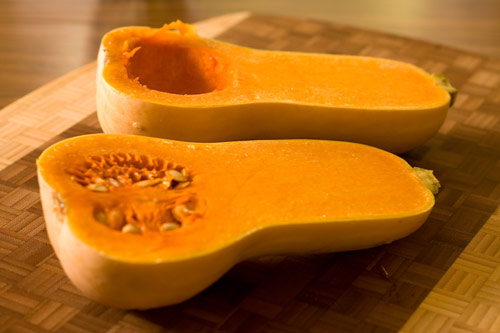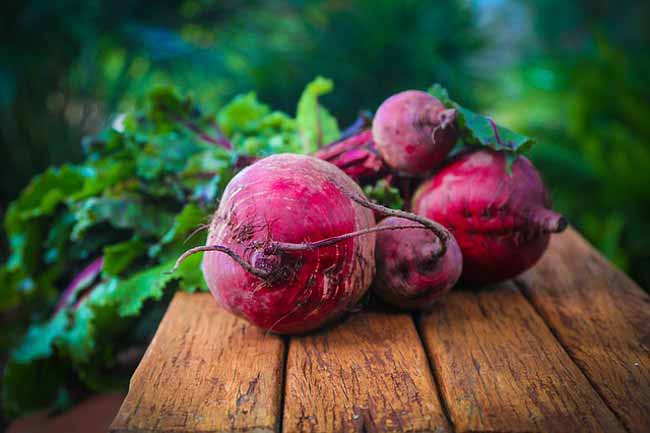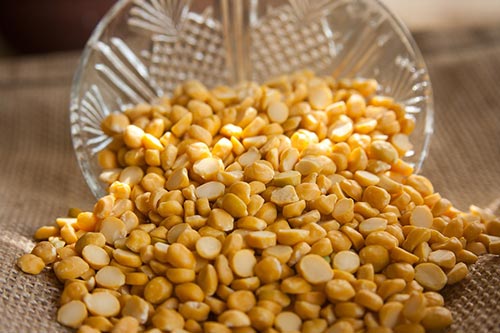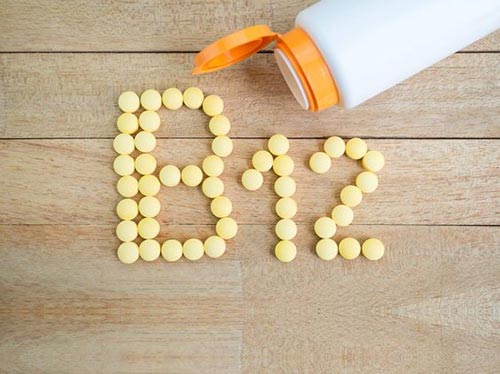Tryptophan & Serotonin | Deficiency | Production | The turkey myth | Arachidonic acid | Carbs & serotonin | Depression | Vegan Sources | Supplements
Tryptophan is an amino acid found in foods that contain protein.
Amino acids are the building blocks of protein, but they also have other roles in the body.
One of these roles is to produce molecules that help the body transmit signals.
Tryptophan, specifically, can be converted into a molecule called 5-HTP (5-hydroxytryptophan). This is used to make serotonin and melatonin.
So to boost your serotonin levels, you need tryptophan.
In this post, we'll find out exactly which plant-based foods you can get your tryptophan from, and what benefits increased tryptophan and serotonin can have on the body.

Butternut squash seeds contain lots of tryptophan and are scientifically proven to help mood & anxiety.
Tryptophan and Serotonin
To understand tryptophan, its role in mood and the plant-based foods we can obtain it from, we first need to understand serotonin.
Serotonin is of significant important because it affects a number of organs, including the brain and intestines.
Known as the ‘happy hormone/molecule', serotonin plays a crucial role in regulating mood and also in promoting feelings of wellbeing and positivity.
Serotonin also works to support healthy brain function, which includes promoting mental cognition and emotional stability.
Other body processes also greatly benefit from the presence of serotonin, such as social behavior, sex drive, a solid sleep schedule, and learning and memory.
What Happens When You're Serotonin Deficient?
Because serotonin has such an effect on the body and the brain, a lack of serotonin in the body can lead to some unpleasant symptoms.
These include:
- anger.
- digestive disorders (including constipation).
- an increased sensitivity to pain.
- changes in eating patterns (including binge eating bouts and an increased desire for carbohydrates).
- separation anxiety or dependency.
- disrupted sleep schedule.
- issues with self-esteem.
- headaches and migraines.
- general bad moods.
Serotonin deficiency manifests differently in men and in women.
Women with a lack in serotonin have a general propensity to experience depressed moods and increased anxiety.
Men are more prone to impulse control disorders, including ADHD. Low serotonin also makes men more susceptible to alcoholism and potentially other addictive diseases.
Studies show that a decrease in serotonin can also greatly impact a person’s length of life and lead to increased rates of many diseases, including:
- heart disease.
- Alzheimer’s.
- dementia.
- asthma.
- fibromyalgia.
- migraines.
- irritable bowel syndrome (IBS).
- anxiety.
- insomnia.
- depression.
Serotonin Production: Intestine Vs. the Brain
Interestingly, 90%+ of serotonin is produced in the digestive tract.
Peripheral serotonin is created in the intestines by the enterochromaffin cells, and also by immune cells and certain gut neurons.
Serotonin produced in the brain is created by raphe neurons that directly supply the brain.
The serotonin is molecularly the same, but the molecules are produced by different types of cells and can elicit a variety of functions.
A common misconception is that eating serotonin-rich foods will improve the amount of serotonin molecule in the brain and improve mood.
Unfortunately it isn't that simple. Serotonin produced in the intestine can’t cross the blood barrier to the brain.
However, it can with the help of a precursor.
This precursor is then amino acid, tryptophan.
Humans have a transport protein in the brain that plucks tryptophan out of the bloodstream. So what you eat can end up affecting your mood.
How to Get Tryptophan: Debunking “The Turkey Myth”
Many people associate tryptophan with eating turkey.
And while it does contain a high-level of tryptophan, turkey doesn’t have any more tryptophan than other types of poultry.
While poultry is tryptophan-rich, science shows us that animal foods are not the best way to obtain tryptophan.
In fact, researchers note:
When tryptophan is ingested as part of a high protein meal, serum tryptophan levels rise, but brain tryptophan levels decline… due to the mechanism of transport used by tryptophan to cross the blood-brain barrier.
In one study, the tryptophan levels in those given a high-protein turkey, egg, and cheese breakfast dropped, whereas in the waffle-OJ group, their tryptophan levels went up.
Click here to see Tryptophan supplements
Bad Moods & Arachidonic Acid (animal proteins)
While we're on this subject: There's a good reason vegetarians and vegans are known to experience less anxiety and better moods than their omnivorous counterparts.
That reason is a decreased presence of arachidonic acid, a substance that can be found in animal proteins.
Arachidonic acid is metabolized in the body to ‘produce inflammatory mediators: they convert the arachidonic acids into specific compounds that create inflammation and pain.
In fact, that’s how anti-inflammatory drugs like aspirin and ibuprofen work—by interfering with the conversion of arachidonic acid into compounds that produce inflammation, pain, and swelling.
Arachidonic acid is overwhelmingly found in chicken and eggs, though there’s also some in beef, pork, fish and other animal products.
Omnivores have more of the acid in their bodies, therefore creating more pro-inflammatory compounds that contribute to poor mood and raised levels of stress and anxiety.
You'd be a bad mood too if your body was blown up like a balloon!
So while you might get tryptophan from poultry, it may be counterproductive, because the arachidonic acid will negatively affect your mood anyway.
How Carbs Increase Serotonin Synthesis
Eating carbohydrates triggers a release of insulin, which forces muscles to ‘eat’ non-tryptophan amino acids as their food or fuel.
This is actually beneficial to the brain – because it frees tryptophan up to be absorbed by the brain.
Interestingly, researchers found that women who suffer from PMS experience carb cravings. This may be a message from the brain to ingest more tryptophan in order to alleviate their symptoms.
The researchers note that:
Consumption of a carbohydrate-rich, protein-poor evening test meal during the premenstrual period improved depression, tension, anger, confusion, sadness, fatigue, alertness, and calmness scores significantly among patients with premenstrual syndrome.
The synthesis of serotonin in the brain also tied with mood and appetite – serotonin will also spike after carbohydrate intake, leading to a very understandable reason for carbohydrate cravings during PMS (Study).
The study followed 19 patients who suffered from severe premenstrual syndrome.
Mood was assessed by the Hamilton Depression Scale. Fatigue, sociability, appetite, and carbohydrate craving were also measured.
The researchers also measured nutrient intake in the patients, noting that carbohydrate intake increased significantly during the late luteal phase (24% from meals and 43% from snacks).
The researchers also found that carbohydrate-rich, protein-poor evening test meal during the luteal phase improved PMS symptoms like depression, tension, confusion, sadness, fatigue, anger, alertness, and calmness.
They reasoned that synthesis of brain serotonin increases after carbohydrate intake.
This makes sense, as women with PMS might be trying to improve their moods through their meals.
Let's face it, we all feel good when we “carb up!”
Your next read: Are You Getting Enough B12?
Fruit for Treating Depression (Low Serotonin)
A recent article in the Journal of Neuropsychiatry and Clinical Neuroscience noted that fruit could be used as an effective treatment for depression, for which a low level of serotonin may be held accountable.
While most treatments for depression now hinge on SSRI drugs, such as Prozac, the side effects of such drugs are significant enough to want to choose an alternate method.
Researchers found that depression patients who supplement with fruits like plantains, pineapples, bananas, kiwis, plums, and tomatoes see reduced symptoms.
However, the best foods to eat to promote serotonin levels in the brain are those with a high protein to tryptophan ratio, as we'll find out below.
10 Tryptophan-Rich Vegan Foods
While tryptophan-rich foods are the way to go, researchers found that protein-sourced tryptophan paired with carbohydrates resulted in a:
‘Significant improvement on an objective measure of anxiety.’ They concluded that protein-source tryptophan (in combination with a high glycaemic carbohydrate) is an easy way to help those suffering from social anxiety.
Note that before studies like this, it was thought that a change in the composition of intact dietary protein was not seen as a possible option for the treatment of common psychological disorders associated with low serotonin levels.
However, previous studies were done using animal proteins, which as we learned above in the arachidonic acid section can make mood worse. not better.
To maximize mood-elevation, we should ideally choose foods with a high tryptophan-to-total protein ratio, which would primarily be seeds such as sesame, sunflower and pumpkin varieties.
With that in mind, here's 10 of the highest serotonin plant-based foods you can consume.
Note: The Recommended Daily Allowance (RDA) of tryptophan from the World Health Organization is a daily intake of 3.5 milligrams per kilogram of weight, which works out to around 225 milligrams for a 140-pound woman.
As you'll see, it's very easy to get this from a plant-based diet.
1. Butternut Squash Seeds
Because serotonin is best elevated with a source of tryptophan and protein, seeds are a great choice, specifically butternut squash seeds.
These seeds were used during a study of those suffering from social phobia. Significant improvement in anxiety was measured among those who consumed squash seed bars.
For a typical serving of 1 cup (or 129 g), you'll get 0.74 g of Tryptophan.
2. Sea Vegetables
Veggies like kelp, seaweed, and spirulina are all fantastic sources of tryptophan. These veggies contain about 3 percent of your daily tryptophan requirement.
3. Soy
You can get your soy through soybeans, tofu, and soymilk.
One cup of soy beans contain 535mg of Tryptophan. That's 191% of the RDA.
4. Oat Bran
Containing 315 mg (113% RDA) of tryptophan per cup, oat bran is cheap and easy to add to cereal, salads and other dishes. Wheat is also a good source of this amino acid.
5. Walnuts
Walnuts are an incredible source of polyunsaturated fats, omega-6 fatty acids, and can reduce bad cholesterol.
These healthy nuts also improve metabolism and can help control diabetes.
One serving of walnuts (about a handful) contains 318 mg of tryptophan. That's more than the RDA.
6. Leafy Greens
Known for their alkalizing properties, leafy greens are high in fiber, vitamin C and phytochemicals and they’re low in fat. Leafy greens help fight chronic disease.
Greens like spinach are high in tryptophan, at 80 mg per ounce.
7. Potato
Another cheap and accessible food source, potatoes are a great source of vitamin B6, potassium, vitamin C and dietary fiber.
Potatoes also contain 80 mg of tryptophan per ounce.
8. Cauliflower
Closely related to broccoli, cauliflower is an excellent source of protein, fiber and also potassium. It is loaded with amino acids, including tryptophan, and contains about 25 mg per ounce.
9. Mushrooms
Another healthy tryptophan food is mushrooms.
Mushrooms are rich in vitamin D, selenium, antioxidants, and B2 vitamins, and also contain 25 mg of tryptophan per ounce.
10. Cucumber
Even your side salad can boost your tryptophan.
Cucumbers are a great source of molybdenum, vitamin K, vitamin C, potassium, magnesium, and silica, and provide a moderate amount of tryptophan at 10 mg per 100 grams.
Summary:
A serving of walnuts or pumpkin seeds, some soy milk, and veggies for dinner and you will easily hit your tryptophan requirement and boost your serotonin production.
Is it Safe to Supplement with Tryptophan Pills?
If you're concerned you may not be getting enough tryptophan, you have probably considered supplementing.
Tryptophan pills, to improve mood, became a popular dietary supplement some years back, until people started dying from something called eosinophilia myalgia syndrome.
This is an incurable, debilitating, and sometimes fatal flu-like neurological condition, caused by the ingestion of tryptophan supplements.
Now, this may have been due to some unknown impurity, which has yet to be identified.
But what followed was a ban by the Food and Drug Administration (FDA) on the sale of L-tryptophan. And, just as they presumed, the incidence of EMS declined rapidly.
However, the ban was lifted in 2005 and it is said that no new cases were reported.
Contrary, this study reports a new case of L-tryptophan-associated EMS, and evidence of historical and related issues.
That said, millions of people take tryptophan supplements with no issue, and say they feel improvement in mood and sleep. It is a personal choice.
But it is preferable to obtain your tryptophan from plant-based foods first.




I was interested in tryptophan sources to feed the large intestine micro-biom the precursors to mark B3 for the kreb cycle and methlyation cycles…..but thanks for the food list…I will see if any other than bananas will do the trick
Jan 20, 2023 at 7:33 pm
No worries. Hope the list helps!
Jan 20, 2023 at 7:43 pm
Arachidonic acid is toxic but it is actually synthesized from linoleic acid which in turn originates from plants.
Jun 07, 2019 at 10:08 am
Indeed. And when we remove chicken and eggs, and other meat from the diet, we can eliminate preformed arachidonic acid from our diet and this may improve mood. See here: https://nutritionfacts.org/video/plant-based-diets-for-improved-mood-and-productivity/
Jun 07, 2019 at 10:32 am
Thank you for this article! Very informative! I’m a vegan and my mother insists on telling me to eat ‘chicken soup’ to cure my winter sniffles because of the triptophan (she refuses to grasp or accept this ‘insanely radical and unhealthy’ plant-based diet that I’m on). I hate to break it to her, but animal protein does more bad than good for us! I’m definitely forwarding this article for her! (Love your garden by the way!) 🤗 Thanks again for the awesome article!
Dec 01, 2018 at 10:23 am
Ah, that radically insane diet that provides your body with really nutrient dense foods that create a disease and infection resistant body…yep, I know the one. Thanks Stacey. Had some good crops this year 🙂 All the best.
Dec 01, 2018 at 9:57 pm
Fantastic article. Most accurate I have found on tryptophan . Many do not mention GMOs. Studies have found our bodies react to the BT Toxins in GMOs the same way it would if you had food poisoning. Also they spray glyphosate or glufonisate on GMOs and our food supply had been found to be heavily contaminated with them. They have all sorts of ill health effects and also kill our good gut bacteria. Even eating non GMO we can be consuming glyphosate and glufonisate because they use them to dry beans and grains.
Jun 19, 2018 at 4:27 pm